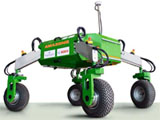Agricultural and Biological Systems Engineering, Department of

Department of Agricultural and Biological Systems Engineering: Faculty Publications
Document Type
Article
Date of this Version
2019
Citation
Front. Environ. Sci. 7:38.
Abstract
Problems at the nexus of Food, Energy and Water Systems (FEWS) are among the most complex challenges we face. Spanning simple to complex temporal, geographic, social, and political framings, the questions raised at this nexus require multidisciplinary if not transdisciplinary approaches. Answers to these questions must draw from engineering, the physical and biological sciences, and the social sciences. Practical solutions depend upon a wide community of stakeholders, including industry, policymakers, and the general public. Yet there are many obstacles to working in a transdisciplinary environment: unfamiliar concepts, specialized terminology, and countless “blind” spots. Graduate education occurs in disciplinary ‘silos’, often with little regard for the unintended consequences of our research. Existing pedagogicalmodels do not usually train students to understand neighboring disciplines, thus limiting student learning to narrow areas of expertise, and obstructing their potential for transdisciplinary discourse over their careers. Our goal is a virtual resource center—the INFEWS-ER—that provides educational opportunities to supplement graduate students, especially in their development of transdisciplinary competences. Addressing the grand challenges at the heart of the FEWS nexus will depend upon such competence. Students and scholars from diverse disciplines are working together to develop the INFEWS-ER. To date, we have sponsored both a workshop and a symposium to identify priorities to design the initial curriculum. We have also conducted surveys of the larger community of FEWS researchers. Our work confirms a widespread interest in transdisciplinary training and helps to identify core themes and promising pedagogical approaches. Our curriculum now centers upon several “Cohort Challenges,” supported by various “Toolbox Modules” organized around key themes (e.g., communicating science). We plan to initiate the first cohort of students in October of 2018. Students who successfully complete their Cohort Challenges will be certified as the FEW Graduate Scholars. In this paper, we describe the development of this curriculum. We begin with the need for training in transdisciplinary research. We then describe the workshop and symposium, as well as our survey results. We conclude with an outline of the curriculum, including the current Cohort Challenges and Toolbox Modules.
Included in
Bioresource and Agricultural Engineering Commons, Environmental Engineering Commons, Other Civil and Environmental Engineering Commons


Comments
Copyright © 2019 Rodríguez, Marshall, Cotton, Koelsch, Koziel, Meyer, Steward, Heemstra, Padmanabahn, Classen, Meyer, Ruddell, Ryan, Cai, Habib and Saundry.
Open access
doi: 10.3389/fenvs.2019.00038